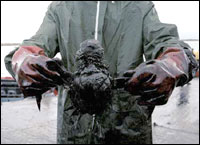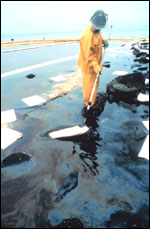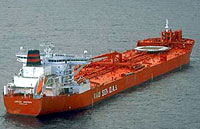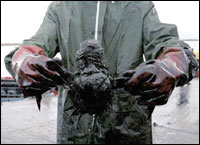In the wake of November’s massive oil spill off the coast of Spain that continues to despoil hundreds of miles of undeveloped shoreline, disrupt vast fisheries, and jeopardize the livelihoods of the people who depend on them, the European Union has begun to crack down on old, poorly maintained, single-hulled tankers like the sunken “Prestige.” Meanwhile, what is the U.S. doing to protect its waters?

A volunteer holds an oil-soaked bird on the Spanish coast.
Photo: Greenpeace Spain.
The U.S. Coast Guard claims that ships like the “Prestige” would probably not even be allowed to operate in American waters — even though the vessel passed a Coast Guard inspection several years ago. Still, rust-bucket ships are just one of many threats the oil business poses to U.S. waterways. Take, for instance, the industry’s likely failure to convert all tankers operating in U.S. waters to double-hulls by 2015, a deadline established under the Oil Pollution Act of 1990, which was passed after the Exxon Valdez disaster.
“People are not knocking down our doors placing orders [for double-hulled tankers],” reports American Shipbuilding Association President Cynthia Brown. “There’s no sense of urgency, and if they don’t order soon, shipyards won’t be able to deliver on time. I think this is an intentional strategy by the oil companies to delay — and when the yards can’t deliver, they’ll ask Congress for relief.”
Another cause for alarm is the practice of drilling and piping oil below sea ice. Oil-spill exercises conducted in the spring and fall of 2000 by the industry, the Coast Guard, the Interior Department’s Mineral Management Service, and the state of Alaska found that existing oil-spill response equipment is inadequate, and that booms (which are used to skim oil off the surface of water) and other gear fail to function effectively in conditions exceeding 10 to 30 percent ice coverage — less than the typical coverage for the area. Nonetheless, energy giant BP and other companies are continuing to develop offshore oil fields, such as “North Star” on Alaska’s North Slope.

Cleaning oil from Prince William Sound after the Exxon-Valdez spill.
Photo: NOAA.
Drilling platforms also operate in winter ice conditions in Alaska’s Cook Inlet, one of the most pristine marine wildlife areas in the United States. The operations have resulted in widespread, documented oil leakage from aging pipelines and onshore refineries. The U.S. EPA, MMS, and state agencies have all denied responsibility for oversight and cleanup of this problem, which continues to grow. Oil carriers entering and leaving Cook Inlet, which has some of the most extreme tidal shifts in North America, also lack the escort vessels, standby oil-spill response equipment, and other safety measures that have been in effect in Prince Williams Sound since the Exxon Valdez spill 14 years ago.
Deep drilling in the Gulf of Mexico, at depths of 1,000 to 10,000 feet, now accounts for more than 50 percent of the region’s oil and gas production — and almost half of all U.S. offshore production. The government provides subsidies (in the form of royalty holidays) for this deep-ocean drilling, but largely ignores the risk of deep-ocean spills. In 1998, the oil industry and MMS began studying the likely effects of a deep-ocean spill; conclusions from their test releases of oil in the North Sea suggest that the oil plume from a deep-water blow-out would surface hours after the disaster and miles away from the site, and would be so widespread at that point as to be uncontainable. In September, Unocal reported that an exploratory well it had drilled in mile-deep waters off of Indonesia had been leaking for more than a month, spreading a sheen of oil across the Makassar Straits.
Continued leakage of 33,000 gallons a day from the Prestige, now lying in 18,000 feet of water off Spain, demonstrates the difficulty of dealing with deep-ocean oil releases. Despite years of multi-billion-dollar profits already extracted from these depths, there are still no established spill protocols or equipment for capping or tapping a deep-water oil release.

A Floating Production, Storage, and Offloading system.
Photo: U.S. Department of Interior.
Oil tankers known as Floating Production, Storage, and Offloading systems are moored to the seafloor and equipped for oil drilling and storage. They have long been banned in U.S. waters as an environmental hazard. In the past, the offshore-production industry argued that drilling and piping oil ashore from fixed platforms was safer than transporting it in tankers. But FPSOs combine the worst risks of both production and transport, which is why many critics consider them unsafe. An FPSO ship would operate in 10,000-foot depths in the Gulf of Mexico and then regularly offload its stored oil to smaller tankers in open waters exposed to some of the worst hurricane conditions in the Western Hemisphere. Nonetheless, MMS has reversed its long-held position banning FPSOs and has indicated a willingness to approve future industry requests to introduce them in the Gulf of Mexico.
No one familiar with Mineral Management Service’s environmental record can be surprised by this latest move. MMS has long been recognized as a tool of the oil and gas industry. Its mandate to increase production and revenue (both for industry and the government through royalty payments) continues to supercede its obligation to prevent oil-spill disasters in U.S. waters. Decisions such as whether or not to permit drilling off the coast of Florida (where the president’s brother is governor) seem to be made on a political rather than a scientific basis. When asked why MMS has never canceled a lease sale based on its own biologists’ oil-spill risk assessments, Bob LaBelle, chief of MMS’s Environmental Division, responded, “It’s hard to make or break something as big as a lease on one issue.”
There are other risks posed to U.S. waters by the oil industry as well, including the security of tanker terminals and coastal refineries, marine hydrocarbon pollution from operational leakages in the Gulf of Mexico, and the impact on sperm whales and deep-ocean ecosystems from acoustic guns used in deep-oil survey work. None of these issues is being adequately addressed. For a long time, there has been insufficient public agency oversight on these matters; now, unfortunately, we also have an administration that seems more concerned with maximizing offshore fossil fuel production than with protecting our nation from an environmental disaster like the Prestige spill.


